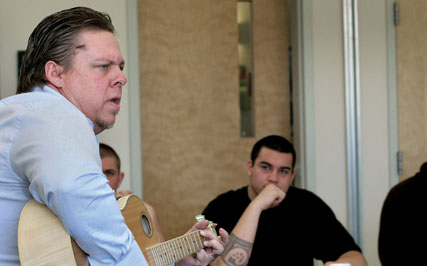Health & Education
Learning and hoops

Spring break means wild beach parties in Cancun on some campuses, but for 20 athletes and other students at Oregon State University, this year's spring break featured an intensive Ethnic Studies course held in Oregon Indian Country.
The course, Learning Through Listening, started 12 years ago as one way to give Oregon State students a worthwhile endeavor for the short spring vacation.
Today, the spring break program continues to receive support from faculty and coaches alike.
Oregon State head football coach Mike Riley always encourages athletes to sign up, said Kurt Peters, who runs the course and is professor of Ethnic Studies at Oregon State.
"Part of it is the demands on their time dictate that they often don't have time to go home during spring break," he said. "Sometimes, they're catching up on academics; sometimes, it's their normal workout routines. And the idea that they can take 30 classroom hours in one week is very appealing."
But there is more.
"I am very excited for our athletes to have the opportunity to take this class in Grand Ronde," Riley said. "This week can be a life-changing moment for those that are in the class. I know the guys that have taken this class in the past have had an awesome experience."
"The idea," said Peters, "is to have students get out of the campus setting and actually come meet people on a one-to-one basis to better understand how those communities are organized and run, and to see the similarities and differences among Native communities."
Over the years, almost all nine federally-recognized Oregon Tribes have participated.
"If you go out in the community," said Peters, "you are forced to face Indian communities very dramatically and practically. You see it. You're there. You hear firsthand from real people, not a streaming video on the Internet, not a distance-delivered course, or a textbook. You hear from the Tribal communities and Tribal members what their issues are and their interactions with other communities."
For Megan O'Quin, Oregon State's Athletic Academic counselor for football and gymnastics athletes, "Not many people have the chance to learn about this very important piece of our country. The students take away more than just learning about a culture. They have an opportunity to look at themselves and reflect."
The course took students to Siletz Country on the coast on Monday and Tuesday, March 21-22, and to Grand Ronde on March 23-24.
Tribal member Brent Merrill helped put the class together for Peters and lectured as well. He currently owns his own public relations consulting firm.
Students met at the Hatfield Marine Science Center on the coast as well as at Grand Ronde and Siletz Tribal offices.
This year, Riley recommended Sherman Alexie's "The Absolutely True Diary Of A Part-Time Indian" as required reading for the course.
In Grand Ronde, Tribal member and Native American Music Awards Artist of the Year Jan Michael Looking Wolf Reibach talked about what it means to be a Native American in the 21st century.
Afterwards, the group honored Peters, who is retiring this year, with a Tribal blanket, cake and party. Reibach sang one of his own songs for Peters, "If Just One of Us," and said it also referred to Peters' belief in his students.
At noon Wednesday, students and athletes dropped into the Tribal gym for a pickup basketball game with Grand Ronde Tribal members, staff and community members. Tribal Elder and Recreation Coordinator Alton Butler refereed.
The group honored Chinook Winds Casino's General Manager Sar Richards (Siletz), presenting him with a picture of his ancestor, John Collins, who was the first Native graduate at Oregon State University.
Grand Ronde Tribal Elder Bob Tom spoke and offered invocations and blessings for the classes. Rounding out the Grand Ronde segment, Tribal member and Education Division Manager April Campbell, Scholarship coordinator Luhui Whitebear (Coastal Band Chumash), Tribal member and Cultural Protection Coordinator Eirik Thorsgard, Tribal member and Web designer Willie Mercier, who took a course from Peters last year, and Tribal Elder Jan Reibach participated with their various perspectives.
"It's more than I expected," said freshman safety Ryan Murphy, who is from Oakland, Calif. "Culturally, the Tribal community is way different from mainstream culture. Tribal people care for each other. They're more united."
Murphy complimented Peters for encouraging class members to express themselves on the subject before visiting the Tribes to contrast that with what they'd learned after visiting.
Sophomore Theo Limlengco of Portland called the class "an opportunity that we never get, to meet with Elders and Tribal community members. It opened my eyes to a whole new culture."
Interdisciplinary graduate student Christopher DeMarre said the Tribal community "is something everybody should see. It's kind of like the invisible culture."
The content of the class changes each year, said Peters, and that "is what makes it unique."
